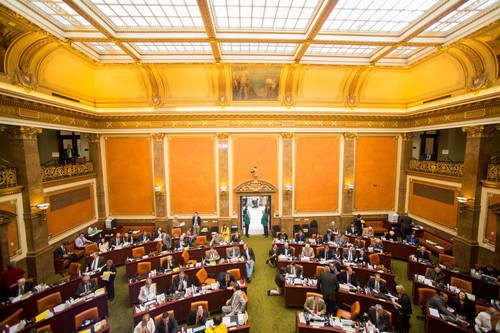This is an archived article that was published on sltrib.com in 2014, and information in the article may be outdated. It is provided only for personal research purposes and may not be reprinted.
When the 2014 Regular Session of the Utah Legislature began, House Speaker Becky Lockhart issued a ringing call to action that mostly sought to make her look good next to Gov. Gary Herbert, whom she labeled an "inaction figure."
Forty-five days later, the session has adjourned. And, for whatever grand plans Lockhart and her fellow legislators may have harbored at the outset, any Capitol criticisms of Herbert as an inert substance are clearly hypocritical. For this was the year of the Inaction Legislature.
The only big thing Lockhart was behind was her own half-baked scheme to put high-tech gizmos into the hands of every public school student in the state. It would have cost hundreds of millions of dollars, money the state is never able to find for more basic educational needs, and neither the governor nor the Senate had any stomach for it.
Meanwhile, it was a session of nibbling around the edges of some of the state's most immediate needs. Positive steps were taken in the areas of air quality, education, political reform and health. But whenever lawmakers walked up to the edge of any game-changing action that could have made real improvements in Utahns' quality of life, they quickly stepped back from the brink.
Two of the more significant moves were not so much taken by the Legislature as forced upon it.
The Count My Vote initiative, which would have replaced the state's exclusionary caucus-and-convention system with direct primaries, was close enough to success that the Legislature passed SB54, which blends the two approaches in a way that should make our democracy a lot more, well, democratic.
And press reports about the ethics scandals surrounding then-Attorney General John Swallow pushed the House toward what was clearly its finest hour this year, a deep and fearless investigation that led to Swallow's resignation, the possibility of criminal charges and a few useful reforms of the state's campaign finance laws.
In other areas, though, success was limited to baby steps taken only after small groups of citizens worked long and hard to personalize their concerns. Larger steps that would benefit millions of Utahns failed to win approval.
Here, briefly, are some of the more important actions the 2014 session took, and failed to take:
Air quality • Lawmakers voted money to phase out some of the state's dirtiest school buses, buy more low-emissions vehicles for the state's own fleet and help people replace high-pollution wood-burning heating systems. But the two proposals that stood to do the most good — allowing Utah regulators to write emissions rules that are more stringent than the federal government's, and allowing communities to vote for sales tax hikes for mass transit — died. The Legislature's fear of raising taxes and regulating business trumped the people's health.
Education • Once again, Utah schoolchildren will see little, if any, new money for their classroom needs. Legislators approved $62 million to cover basic education for about 10,000 additional children expected next year and another $62 million to increase per-pupil spending. That money likely will be eaten up by mandated insurance and retirement increases. Two bright spots: An innovative public-private partnership will provide funding to make quality preschool available for at-risk kids and schools will be allowed to teach sex-abuse prevention. Colleges and universities received $50 million they requested to bring state support at open-access schools to a more competitive level.
Health care • The Legislature took no action on the already horrendously overdue move to expand Medicaid, as envisioned by the federal Affordable Care Act, leaving hundreds of thousands of Utahns without access to affordable health care. Lawmakers did take pity on smaller, better organized constituencies, rightly allocating more money and mandating insurance coverage for more children with autism, and legalizing limited use of cannabis oil for young people suffering from epilepsy.
Ethics in government • The change that would have done the most good in cleaning up Utah's political culture, placing caps on political donations, was frustrated yet again. But lawmakers did approve bills that will make those unlimited gifts — whence they come and how they are spent — more transparent to voters.
Public safety • In a move more likely to set off a land rush than to improve the state's correctional system, lawmakers moved forward with a plan to raze the state prison in Draper and move it to some other, as yet undetermined, location. The Legislature also undermined public safety by passing measures that would lengthen the stretches of freeway that can have speed limits of up to 80 mph, refusing to toughen state seat-belt laws and by reaffirming the people's right to openly carry firearms without being charged with for disorderly conduct.
Urban development • Legislators also did not solve the persistent problem of annexations and incorporations in Salt Lake County, but they did take the right step of freezing the county's municipal boundaries while a solution is found. County Mayor Ben McAdams had a grand plan to create a scattered city out of the remaining unincorporated parts of the valley. Lawmakers rejected that, but they did allow for creation of a special service district for those areas, and they allowed for a possible Millcreek City as some residents seek. Now McAdams and the rest of the county have until November 2015 to come up with a workable plan.



